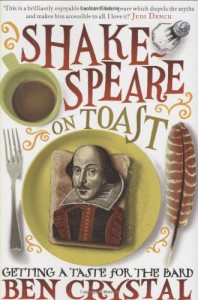"Shakespeare on Toast" by Ben Crystal

After reading “The Shakespeare Wars” by Ron Rosenbaum (review here), I sunk into a lethargic stupor. What can I read that will topple Rosenbaum’s book? I’d “Shakespeare on Toast” on my TBR Pile for a while. It went there just when it came out, but I thought it’d be something of a pastiche on Shakespeare's works, and I was not in the mood for that. What finally made the decision for me was my subconscious. I wanted something that could be used as a counterpoint to the Rosenbaum’s book. At least that was what I thought, but the book is nothing of the sort. It’s instead a nice complement to the Rosenbaum’s book. It didn’t exactly rock my socks off, ie, it didn’t revolutionize the way I see Shakespeare, but it gave me a fresh, zingy insight into his work.
Ben Crystal’s book tries to demystify Shakespeare by putting a new twist on the usual Shakespeare reference works. It attempts to explain the idiosyncrasies of Shakespeare’s language (the usual much vituperated iambic pentameter, which is the main stumbling block, where most people fall when dealing with Shakespeare), as well as giving us the context of the plays. In the Elizabethan and Jacobean days, Shakespeare's plays weren't viewed by the audience as something deep and meaningful that should be analyzed again and again ad nauseum. Instead, it would be something along the lines of a soap opera.
One of the reasons I love writing book critique is because it allows me the pleasure of close reading. Invariably this leads to question: “Why do you think the writer did that?” The ‘that’ could be a technique, a literary device, a plot point or some clever thing (like the iambic pentameter). Close reading is a wonderful technique to tell us how the writers use language for effect. It’s all about grabbing our attention. They just wrap it up in a nice little phrase that make us think before they answer the questions they always answer. “Shakespeare on Toast” also successfully attempts to answer this question in a roundabout way, ie, tackling the technical aspects that make Shakespeare unique. All by themselves, the several “chapters” dealing with the close reading of the iambic pentameter justify reading the book.
As a trivia snippet, this close reading apparently, when applied to Shakespeare, results in a documented and observed phenomena studied by a British scientist (Professor Philip Davis): “the extra work that the poetry and the unfamiliar words require makes a part of the temporal lobe of your brain known as the Sylvian Fissure light up like a Christmas tree.” (From scene 4). I must say that I’ve never felt a thing in my head (ie, the light bulbs) in all the years I’ve been reading Shakespeare…
Themes the book attempted to address:
- What can we learn about how to break open his plays, from the plays themselves?
- What is it about Shakespeare that draws us in? And what makes hate him?
Why are we talking about Shakespeare and not one of his contemporaries (eg, Christopher Marlowe)? I’ll give you a clue: it’s got to do with iambic pentameter…Mum’s the word.
This line from the Star Trek VI film pin-points the book’s spirit:
Klingon chancellor Gorkon: “You have not experienced Shakespeare until you have read him in the original Klingonese.”
Klingon: “Tak Pah, Tak Beh…"
All: (laughter)
 3
3



